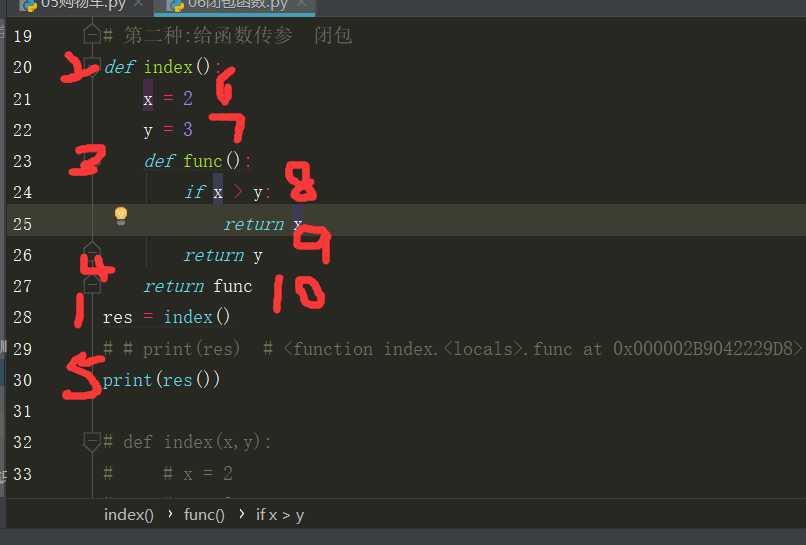标签:info __name__ 字符 函数名 start 优先 res **kwargs image
一.闭包函数
一个函数在另一个函数体内,就是嵌套函数
我把一个函数叫做内部函数,另一个函数叫做外部函数
内部函数可以调用外部函数所有的变量和参数这就叫做闭包函数
1.第一种给给函数传值 传参
# def my_len(x): # print(x) # # n = 0 # # for i in x: # # n += 1 # # print(n) # my_len(‘hello‘)
2.第二种给函数传参 闭包函数
# def index(): # x = 2 # y = 3 # def func(): # if x > y: # return x # return y # return func # res = index() # # print(res) # <function index.<locals>.func at 0x000002B9042229D8> # print(res())

内部函数func可以调用外部函数的变量名x,y
作用意义:内部函数不论在何处被调用,优先使用的是外部函数的作用域
二.装饰器
好比工具,给函数添加功能
必须遵循的原则:
1:不能更改被装饰函数的调用,就是函数名加括号不变
2.不能更改被装饰函数的代码
def index(): pass index()
1.装饰器的模板
# def outer(func): # def inter(*args,**kwargs): # print(‘执行被装饰之前 你可以做的操作‘) # res = func(*args,**kwargs) # print(‘执行被装饰函数之后 你可以做的操作‘) # return res # return inter
2.有参和无参
# 将被装饰的函数(无参) # import time # def index(): # time.sleep(1) # print(‘hello world‘) # 将被装饰的函数(有参)*args,**kwargs # def login(name): # time.sleep(1) # print(‘%s is a good man‘%name) # return ‘hello‘ # 装饰器 # def outer (func): # def my_time(*args,**kwargs): # start = time.time() # func(*args,**kwargs) # func = index函数的地址 函数名加括号直接调用 # end = time.time() # print(‘index程序运行的时间是:%s‘%(end-start)) # return my_time # index = outer(index) # outer(index的地址) # index() # print(index) # <function outer.<locals>.my_time at 0x000001498C362AE8> # login = outer(login) # login(‘egon‘)
3.装饰器语法糖和修补功能
1.@+装饰器函数名后面没有括号,放在紧挨着被装饰函数的上面
2,首先在装饰器前写一个 , from functools import wraps
然后在装饰器的内部和外部函数之间加上@wraps(func)括号内为参数
修补功能的两个作用:
1.用户查看被装饰器装饰函数的函数名时,看到的是被装饰函数的本身 print(index.__name__) # 查看函数名 以字符串形式 2.用户查看被装饰函数的注释时,查看到的是被装饰函数的注释 print(help(index)) # 查看注释内容
from functools import wraps def outer (func): @wraps(func) def my_time(*args,**kwargs): start = time.time() res = func(*args,**kwargs) # func = index函数的地址 函数名加括号直接调用 end = time.time() print(‘index程序运行的时间是:%s‘%(end-start)) return my_time # 被装饰的函数 # import time # @outer # login = outer(login) # def login(name): # time.sleep(1) # print(‘%s is a good man‘%name) # return ‘hello‘ # login(‘egon‘) # 被装饰的函数 import time @outer # index = outer(index) def index(): """ index 的注释 :return: """ time.sleep(1) print(‘hello world‘) index() print(help(index)) print(index.__name__)
标签:info __name__ 字符 函数名 start 优先 res **kwargs image
原文地址:https://www.cnblogs.com/zhuangshenhao/p/11172835.html